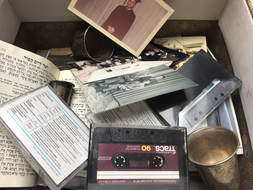 I was in London last week to record a radio documentary for the BBC. The programme, Witness, describes events in history using the voices of people who lived through them. The producer was interested in my grandmother’s stories of the lost Jewish world, as recorded by my father in the 1970s. At that time, Dad was a social historian working at the University of East Anglia in Norwich, England, and Grandma was a tiny, frail old lady in her late 70s, living in Los Angeles. Dad had grown up with his mother’s stories of her early life in Russia and, as an adult and an academic, he wanted to probe deeper into the Jewish community in which she had lived. Over the course of the years that followed, some of the audio tapes Dad recorded became distorted, broken, lost or accidentally re-recorded with pop music (my brother and I were teenagers, we wholeheartedly apologise), but enough remained to ensure that my grandmother’s stories were not lost. Until about 15 years ago I had never listened to these cassettes. They were recorded in Yiddish, a language I don’t understand, and as a youngster I was never sufficiently interested to ask my father to translate them. I had no idea what a rich and fascinating history they would reveal. Even Dad had not revisited the tapes for years. When my father reached his 70s, I began to fear that the stories would be lost. It was a labour of love for the two of us to listen to the cassettes one by one and piece together a story. Hour after hour Dad translated while I typed. These transcripts eventually became the basis for my book, A Forgotten Land. After we had finished translating and transcribing the recordings, Dad put the cassettes away and I did not see them again until I came across them tucked away in a drawer when we cleared Dad’s flat after he died in 2012. I brought them home and put them away in a box with some other items of Dad’s that I kept – some photos, newspaper clippings and the family Kiddush cups. And there they stayed for the next six years. Before my trip to London, I needed to identify the sections of the recordings that would go out on air. First I had to borrow an old tape recorder, and cross my fingers that it didn’t chew up the audio tape. I spent several days listening to the cassettes, digitising them and trying to work out which story was which, listening out for names and places (Bolsheviki, Kerensky, Kiev, Libau), family members, familiar Russian words and anything in Yiddish that my rudimentary knowledge of German was able to pick up. Thankfully I found some of my early transcripts, which were a great help. But as Dad didn’t number the tapes as he recorded or replayed them, everything was utterly jumbled. Eventually I managed to pick out the four short segments that the radio producer wanted to use. At the recording studio, I talked around these stories, filling in background and adding details. When I had finished, an actress arrived to record voice-over translations. She began talking with a theatrical flourish and a mild Russian accent. “No, no,” the producer said. “This is a very simple woman, an uneducated woman, recounting events to her family. Tone it down!” The final result will be broadcast on the BBC World Service in the coming weeks. I wait with bated breath!
1 Comment
Irina Joffe
19/10/2018 06:45:59 am
Спасибо Лиза за твой труд, за необыкновенные воспоминания о папе.
Reply
Leave a Reply. |
Keeping stories aliveThis blog aims to discuss historical events relating to the Jewish communities of Ukraine, and of Eastern Europe more widely. As a storyteller, I hope to keep alive stories of the past and remember those who told or experienced them. Like so many others, I am deeply troubled by the war in Ukraine and for the foreseeable future, most articles published here will focus on the war, with an emphasis on parallels with other tumultuous periods in Ukraine's tragic history. Archives
March 2024
Categories
All
|
 RSS Feed
RSS Feed
